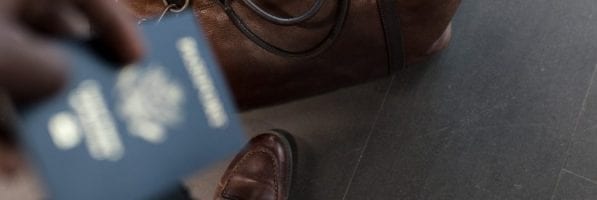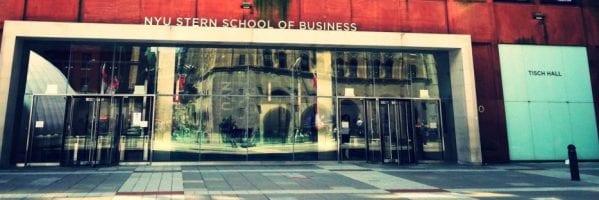New GMAC Report Gives New Warnings for Global Talent Search

A rapidly changing global economy and prohibitive immigration laws are making the search for international talent difficult for U.S. business schools.
Continue reading…NYU Now Accepting GMAC’s Executive Assessment Test Scores for All MBA Programs

Hopeful New York University Stern School of Business applicants will have a new pathway to join the prestigious school.
Where Should You Go? The Benefits of a Mid-Tier MBA

You have an MBA acceptance letter from both Harvard Business School and Cornell SC Johnson. Which do you choose?
Your gut reaction might be to choose Harvard’s top-ranked MBA program without a second’s pause. After all, aren’t business school rankings—like those compiled by the Financial Times and U.S. News & World Report—the most important consideration when choosing your MBA program?
In some cases, you might be right. If you’re most interested in reputation, then ranking is all important. However, there are many times when rankings should be taken with a grain of salt. They tell a story, but not the whole story, especially when it comes to you as an individual candidate.
Just because a specific school is top-ranked, does not mean it should be the top rank for you. Many mid-level MBA programs are just as impressive and could be a better fit for you depending on your needs.
In this article, we’ll take an in-depth look at when and why you should choose a mid-ranked MBA program over a top-ranked program. Continue reading…
The College Admissions Scandal—Could it Happen with MBA Programs?

Earlier this month, dozens of people—including celebrities Lori Laughlin, William H. Macy, Felicity Huffman, and Mossimo Giannulli—were caught greasing the wheels in a major college admissions scandal. Parents funneled a combined total of $25 million through a college admissions consultant, William “Rick” Singer, to athletic coaches and test proctors, all with the aim of gaining admission for their children to an elite undergrad program. Undergraduate programs entangled in the scandal included Stanford University, the University of Southern California, Wake Forest University, Georgetown University, Yale University and others.
Singer organized the bribery through his admissions consulting operation and a phony non-profit called Key Worldwide Foundation. In exchange for payment, the exam proctors would give students more time for the SATs and ACTs, provide answers and even allow substitute test takers. Meanwhile, athletic coaches would push candidates as recruits at their institution, whether or not they even had athletic experience.

Full House actress Lori Laughlin (left) was one of the major names caught in “Operation Varsity Blues,” paying an alleged $500,000 bribery to get her daughters Olivia Jade (center) and Isabella Rose (right) gain admission to USC / Photo via Gabriel Olsen/Getty Images
“Operation Varsity Blues,” as the FBI has nicknamed the investigation, exposed weaknesses in the college admissions process and demonstrated the shocking lengths that some parents will go to in securing a brand name education for their children.
We’ve seen the pressure and the hope of gaining admission to a top business school—so what’s to prevent fellow MBA applicants from gaming the system? Clear Admit believes there are several key differences in the MBA application space that make the “Operation Varsity Blues” type of scandal less likely.
- GMAC Runs a Tight Ship
The Graduate Management Admissions Council (GMAC) owns the GMAT exam, a test required by a majority of leading business schools for admission. The test is only offered via computer, making it harder to bribe a proctor for extra exam time. It also features strict identity security—including palm scanning—that thwarts any attempt of substitution of the test taker. Fraudulent attempts to increase GMAT scores have happened in the past, but GMAC has been swift in taking appropriate measures to avoid future threats to the integrity of the test. For instance, GMAC explicitly chose Pearson as the designated administer of the exam in 2006 due to the firm’s track record in testing security and anti-fraud measures. - Without Sports, There are No Coaches to Bribe
There are no formal athletic programs in graduate business programs. Unlike for the undergraduate scandal, the space for which one would pay simply does not exist. - Integrity Matters, and AIGAC Helps
The Association of International Graduate Admissions Consultants (AIGAC) released a statement upon news of the undergraduate admissions scandal: “AIGAC was established with the express purpose of setting high ethical standards in the graduate admissions consulting industry…AIGAC exists to provide support and professional development for those helping young people self-reflect through the admissions process and attain the right education in the right way.” Scott Shrum, former President and COO of Veritas Prep and current Secretary of AIGAC, added, “One of the most important things AIGAC does is keep the lines of communication open between the admissions consulting industry and administrators at schools. The more the admissions process seems murky to applicants, the more room that shady operators have to operate in the twilight and promise things that they really shouldn’t be promising. The more transparent the process is, the less room there is for that sort of behavior, and AIGAC has helped schools find allies in the industry who also want more transparency. A good admissions coach helps an applicant see the process more clearly and approach it with more confidence, and I credit AIGAC and the schools for helping to make that situation better over the past decade.” - Admissions Consultants Offer Advice On How to Put Your Best Foot Forward, Not Tips to Cheat the System
Shrum also notes, “The journalists who conflate legitimate coaching with this scandal are either deliberately doing it or are missing the point. That’s like saying that hiring a tennis coach and giving your kid steroids are both ways to help your child do better in a tournament, so they must not be very different. While this scandal has rightly shed more light on the college admissions game, Rick Singer and his cronies weren’t admissions counselors. They were crooks.” - Applicants are in the Driver’s Seat
Clear Admit co-founder, Graham Richmond, shared the following observation, “Helicopter parents are much more likely to be present in undergraduate admissions. By the time young people turn their attention to the MBA, they are usually the ones driving the process (and NOT their parents) and therefore, there is far less likelihood of fraud.” - Sooner or Later, the Truth Will Come Out
Shrum also offered this perspective, “I think it would be naive to think [such a scandal] can’t happen in MBA admissions. In the test prep space, the Scoretop scandal from 2008 showed the lengths that people will go to in an effort to boost their GMAT scores. On the admissions side, it’s inevitable that an applicant from a well-connected family, or whose boss is a huge donor to a school, has a leg up in the process. As long as universities value fundraising, I think this will always be the case. With all that said, however, it’s important to keep in mind that business school classes tend to be much smaller than undergraduate colleges, so it’s much tougher to ‘hide’ a mediocre applicant in a class. But it surely happens.”
While the system itself clearly has several safeguards against fraud, Shrum left us with a dose of reality:
“Unethical clients and unscrupulous admissions consultants find each other. It’s rare that an innocent family gets steered into bribery by an unethical consultant, or vice versa. They know what they’re up to, and what/whom to look for. I can’t count the number of times an applicant or parent has asked me, ‘So you’ll write the essays for us, right?’ and when I explain that’s not how it works, they move on. In some cases, I’m sure they find an admissions consultant who will do just that for them. Both parties know that what they’re doing is wrong, but they seem to have no problem doing it.”
The view at Clear Admit is that what happened in the “Operation Varsity Blues” case is clearly repugnant and unethical. It is also sad and a little puzzling.
Richmond offered the following thoughts: “On some level, this shouldn’t be shocking; it’s certainly not the first time we’ve seen people have ethical lapses when they can line their own pockets with money. But what sticks with me is the role that the parents played. These parents—who are presumably well educated and could have theoretically provided a great environment for their children to become smart young people and get into great schools on their own merit—felt the need to cheat. I wonder if they were perhaps too busy with their careers and not bothering to parent (resulting in kids who weren’t motivated enough) … or if they were somehow led to believe that this is how the college admissions game is played. Or perhaps it was just a case of them desperately wanting to be able to brag about the success of their children at cocktail parties? In all cases, it’s just profoundly sad.”
This article on the recent college admissions scandal has been edited and republished with permissions from its original source, Clear Admit.
H-1B Visa Challenges and Post-MBA Industry Employment Outlook

Immigration is in a precarious place in the United States. While media tend to focus on asylum and family separation, the Trump administration has taken aim at the H-1B Visa program. As Clear Admit previously outlined, the H-1B is necessary for any foreign-born individuals who want to work in the United States. Part of the Trump administration’s “America First” policy, the increased attention given to this visa program has created multiple issues for international students and the businesses that hire them.
The first issue that most international MBAs who want to work in the United States will face is the lack of companies who are interested in hiring them. According to the 2018 GMAC Corporate Recruiters Survey, only 47 percent—down from 55 percent in 2017—of all companies surveyed in the United States intended to hiring international candidates. Students interested in working in finance, health care, manufacturing, and nonprofit sectors may want to change their plans as these are the sectors least likely to hire internationals. Only 11 percent of health care firms surveyed said they plan to hire international candidates in 2018, while 14 percent were willing, but had no plans. Seventy-five percent—the highest among the reporting industries—said they would not hire international personnel. Seventy-two percent of non-profit/government agencies and 60 percent of manufacturing companies also responded that they would not be hiring international candidates. The best sectors for international graduates are consulting and technology. Thirty-seven and 39 percent, relatively, reported that they plan to hire international candidates. Over a quarter of companies in both industries reported that they would be willing to hire internationally, but did not have concrete plans to do so.

The reason that it is so hard for international MBA graduates is the nature of the H-1B visa process. If an employer chooses an international graduate and is willing to sponsor their application, neither the firm nor the employee can be sure that the employee will be chosen for the visa lottery.
A current international first-year student at Dartmouth’s Tuck School of Business tells Clear Admit that they haven’t second-guessed their decision to attend a U.S. school:
“I do think about visas, but I am not worried. I look at my MBA from a top school as a long-term investment. I am confident it will deliver returns in many ways throughout my future. My advice to other international students is 1) know why you want the MBA and how precisely you want to utilize it before arriving to school and 2) complete the company research and practice to be extra prepared for recruiting.”
The number of international job-seekers in the United States has declined over the last two years from its peak of 236,000 in 2016. However, the number of applicants for H-1B visas remains high—190,000 people applied for 85,000 H1-B visas in 2018, filling the slots in five days, according to a U.S. Citizenship and Immigrant Services (USCIS) survey.
In addition to the small number of slots, applicants have to deal with the fact that USCIS has increased discretion over how visas are distributed. Although they are generally three years in length, H-1B visas under Trump’s USCIS have been of increasingly bizarre lengths. As noted in the lawsuit, ITServe Alliance v. USCIS, USCIS has issued visas that last one day and 12 days. One specific visa was expired for three weeks before it was received by the recipient. This has led to increased uncertainty around international MBA students getting the cover that they need to work in the United States.
If an international MBA student has received their three-year H-1B visa and has their desired position, he or she might run into difficulty being with their loved ones in the United States. H-1B holders can bring their partners over to stay with them on an H-4 visa while they wait for permanent residency; however, the Trump administration has spoken openly about eliminating this program. While legislation has been proffered to ensure that this program stays in place, the legislation’s chances of becoming law are slim to nil.
Although the current situation is grim, there are efforts being made to improve the situation. Tech firms, a primary beneficiary of the H-1B visa program, have been lobbying Congress to increase the 85,000-person cap for the visas. In addition, there is support among both parties in Congress to ensure that the H-4 program stays in place.
However, this might be too little, too late. These various difficulties have caused a decline in the number of international applicants at U.S.-based MBA programs. According to the GMAC 2018 Application Trends Survey Report, in the two years of the Trump administration, the number of international applicants to full-time MBA programs has decreased 13 percent.
With the system as it is oriented now, being an international MBA student will remain challenging. Tuck’s Emma He T’17 suggests that fellow (and hopeful) international students “target companies early, be willing to expand your search areas, and/or leverage your background for potential visa exceptions” in order to “mitigate visa concerns.”
Relief might come in the future, but it appears that putting America first will hurt U.S. MBA programs.
This article has been edited and republished with permissions from its original source, Clear Admit.
4 MBA Trends to Look Out For In 2019

Recently, we discussed about most important numbers of the previous year. MBA application rates were declining, average salaries are on the upswing, gender equity took major steps, technology and products/services jobs are jumping, and GMAT scores continue to rise. But what does all this mean for 2019?
Are there any MBA trends to look out for in 2019 and what can you expect? Continue reading…
